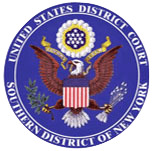| UMG Recordings, Inc. v. MP3.com, Inc. | |
|---|---|
 | |
| Court | United States District Court for the Southern District of New York |
| Full case name | UMG Recordings, Inc. v. MP3.com, Inc. |
| Decided | April 28, 2000 |
| Docket nos. | 1:00-cv-00472 |
| Citation(s) | 92 F. Supp. 2d 349 (S.D.N.Y. 2000) |
| Court membership | |
| Judge(s) sitting | Jed S. Rakoff |
| Keywords | |
| Copyright, Digital Millennium Copyright Act, Safe Harbor | |
UMG Recordings, Inc. v. MP3.com, Inc., 92 F. Supp. 2d 349 (S.D.N.Y. 2000) was a landmark case before Judge Jed S. Rakoff of the U.S. District Court for the Southern District of New York concerning the Internet. The case concerned MP3.com's unauthorized duplication of essentially every music CD ever made for the purposes of launching a service entitled My.MP3.com or "Beam-it", which allowed users to access their private music collections online from anywhere in the world.
With this decision, the court drew a distinction between time shifting and space shifting, which had previously been allowed, and "virtual" space shifting as practiced by My.MP3.com. Before accessing a song from MP3.com's servers, a subscriber first had to "prove" that he already owned the CD by placing his copy of the commercial CD into his computer's CD-ROM drive for several seconds or by purchasing the CD from one of defendant's cooperating online retailers. Id. However, it was MP3.com doing the copying from the CDs onto their servers, and the court found this copying not a fair use.
UMG argued, in part, that the copying was not covered by fair use because entire CDs were copied (instead of excerpts) and that the use was a commercial one (even though no fee was charged, it was supported by ad revenue).
MP3.com defended, in part, that "consumer protection" concepts supported MP3.com's unauthorized use of the intellectual property of the major record labels and music publishers. In ruling, the court indicated that "stripped to its essence, defendant's 'consumer protection' argument amounts to nothing more than a bald claim that (the) defendant should be able to misappropriate (the) plaintiff's property simply because there is a consumer demand for it. This hardly appeals to the conscience of equity."
The resulting litigation and judgments against MP3.com, totaling over $53 million, pushed MP3.com into severe financial difficulties which were averted by a merger with Vivendi Universal.
See also
- IO Group, Inc. v. Veoh Networks, Inc., a similar case
External links
- Text of UMG Recordings, Inc. v. MP3.com, Inc., 92 F. Supp. 2d 349 (S.D.N.Y. 2000) is available from: Google Scholar Leagle University of Houston Law Center
- News of the settlement, from umusic.com
- The Merits in the MP3.com Lawsuit - May 2000 MP3 Newswire article on the Universal/MP3.com court case.